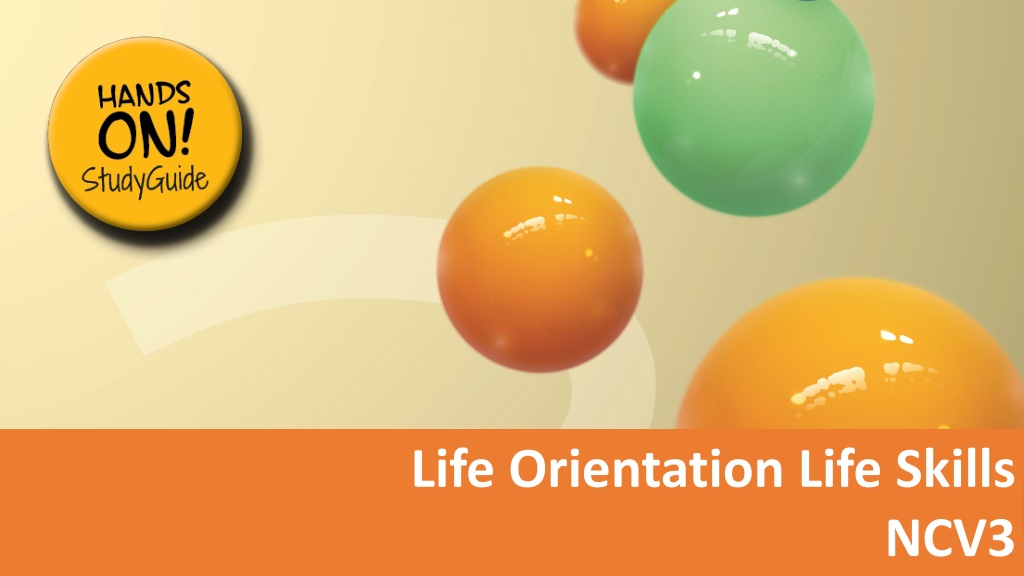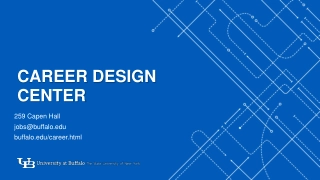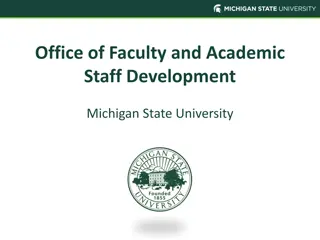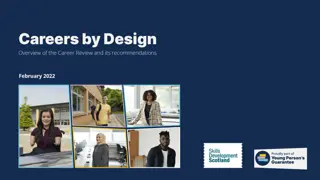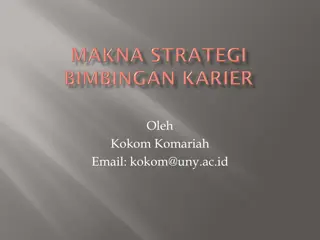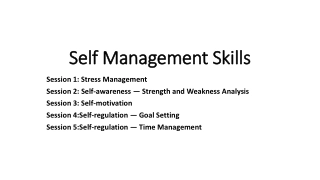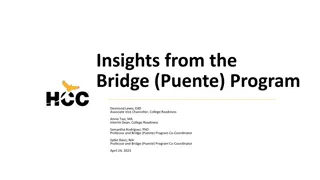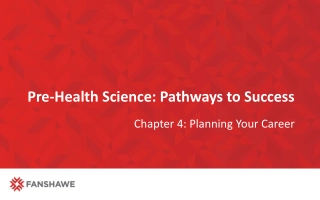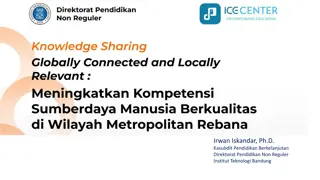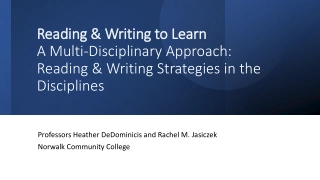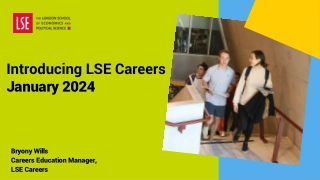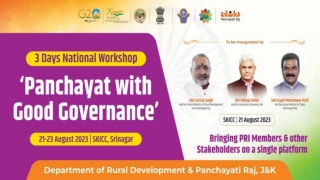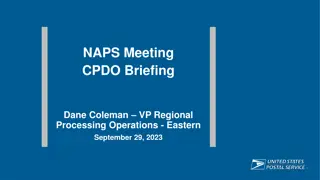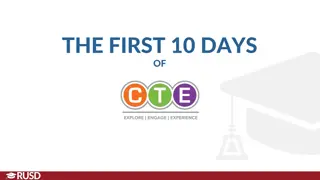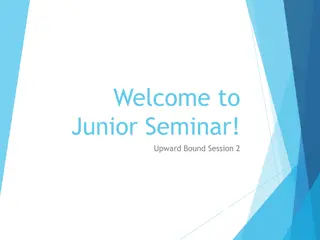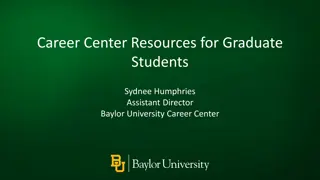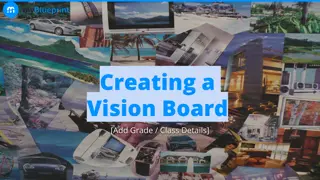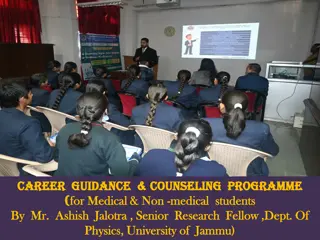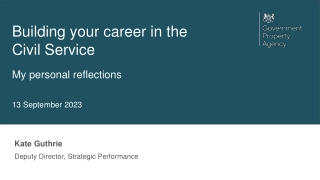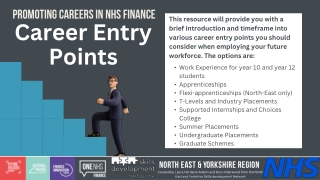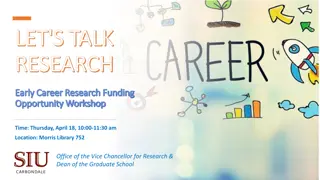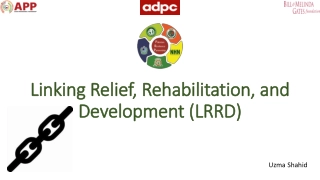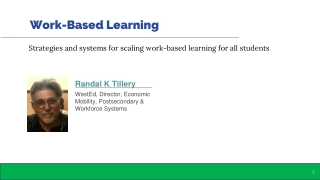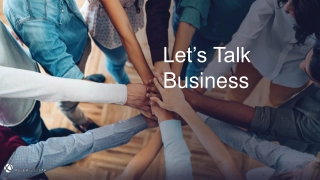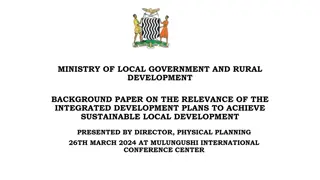Personal and Career Development Strategies for Success
Performing a SWOT analysis on your abilities, exploring career opportunities, understanding job functions, creating a career-path planning personal development plan, and the value of work shadowing and volunteering for gaining experience are essential steps in achieving your career goals. Visit www.futuremanagers.com for detailed guidance.
Download Presentation
Please find below an Image/Link to download the presentation.
The content on the website is provided AS IS for your information and personal use only. It may not be sold, licensed, or shared on other websites without obtaining consent from the author. Download presentation by click this link. If you encounter any issues during the download, it is possible that the publisher has removed the file from their server.
Presentation Transcript
Topic 1 Personal and Career Development PERSONAL AND CAREER DEVELOPMENT Performing a SWOT analysis on your abilities in helpful in finding a career path that suits you. Developing the skills needed for your dream job is important in ensuring your employability. Self-improvement is hard work. Learning a new skill takes extreme commitment. If your goal is attainable and you re prepared to work hard, you will get there. www.futuremanagers.com
Topic 1 Personal and Career Development (continued) CAREER RESEARCH AND EMPLOYMENT OPPORTUNITIES Exploring all avenues to find a job suited for you can take time and can be an ongoing process. There are different ways to find employment opportunities. Local jobs around your community can be advertised in local newspapers. Certain shops have notice boards where people post any needs and job opportunities. Employment agencies also assist employers to find possible employees. www.futuremanagers.com
Topic 1 Personal and Career Development (continued) JOB FUNCTIONS AND OPPORTUNITIES IN MY VOCATIONAL FIELD If you have chosen a specific field of work, there are a wide variety of different jobs that you could choose from in your field. There are also different companies that you could work for. It is important that you explore different job functions and opportunities. www.futuremanagers.com
Topic 1 Personal and Career Development (continued) MY CAREER-PATH-PLANNING PERSONAL DEVELOPMENT PLAN By using a personal development plan, you can plan what to do, schedule it, set a time line, track your progress and constantly review your personal growth. This keeps you on track until you achieve your goal to master some skills. A personal development plan addresses the What, Why, How and When in an understandable and ordered way. This proper structure helps set you up for success in your personal growth. www.futuremanagers.com
Topic 1 Personal and Career Development (continued) WORK SHADOWING AND ITS VALUE Work shadowing is the opportunity to observe and talk to a person as they go about their daily job. Job shadowing is temporary and unpaid exposure to the workplace by literally being the worker s shadow. It is the process of following another worker especially for training or research purposes. www.futuremanagers.com
Topic 1 Personal and Career Development (continued) VOLUNTEERING TO GET EXPERIENCE Volunteering could be very valuable if you are finding it hard to secure a job or while you are looking for a job. It means that you offer your services, without getting paid, to a company. It is better to be busy getting work experience than sitting at home without any development. www.futuremanagers.com
Topic 1 Personal and Career Development (continued) NETWORKING FOR MY FUTURE JOB Networking is about building relationships. It is making friends and helping people who will then remember you for the good impression you have made, when they need someone for a job. www.futuremanagers.com
Topic 1 Personal and Career Development (continued) WORK PRODUCTIVITY Being productive means that you are doing the work that is expected of you and that you deliver it on time and correct. Successful people make the most of their working hours by working smart. Productivity is essential for any organisation no matter how big or small it is. www.futuremanagers.com
Topic 1 Personal and Career Development (continued) EMOTIONS AND WORKPLACE RELATIONSHIPS Working with people from different backgrounds, having different personalities and expectations and values can cause conflict and emotional outbursts. To build sound working relationships must be your priority. www.futuremanagers.com
Topic 1 Personal and Career Development (continued) REPORTING MECHANISMS AND DISCIPLINARY ACTIONS Every workplace should have clear policy and guidelines on individual worker s rights and which reporting mechanisms and disciplinary procedures exist in cases of harassment. The policy should indicate what is acceptable and unacceptable behaviour and which procedures to follow when a person is being harassed. www.futuremanagers.com
Topic 1 Personal and Career Development (continued) CONFLICT AND DEALING WITH PROBLEMATIC RELATIONSHIPS AT WORK Conflict in the workplace seems to be a fact of life. Unethical behaviour and unproductive work result in conflict in the workplace and can be incredibly destructive to good teamwork. To defuse these situations, it helps to take a positive approach to conflict resolution. Discussion should be courteous and non-confrontational, and the focus must be on issues rather than on individuals. www.futuremanagers.com
Topic 2 Learning Skills STUDYING YOUR WAY The brain has two halves or hemispheres, both of which we use when processing new information. No one else processes information in exactly the same way you do and we tend to process information using our dominant or preferred half of the brain. If you discover how you process information best, you can learn things more efficiently and in less time, and you can expand the strategies you use for learning and studying. www.futuremanagers.com
Topic 2 Learning Skills (continued) BRAIN-HEMISPHERE DOMINANCE A preference for using specific cognitive (thinking) abilities. There are two styles of thinking right-brain (intuitive, spontaneous, qualitative [working with evaluations and judgements]) and left-brain (factual, analytical and quantitative [working with numbers]). www.futuremanagers.com
Topic 2 Learning Skills (continued) LEARNING STYLE Learning style is the distinctive and habitual manner to acquire knowledge, skills or attitudes through study or experience. Simply put, it is the way you go about learning things. Most experts agree that there are three basic learning styles, i.e. visual (see), auditory (hear) and kinaesthetic (move and touch). www.futuremanagers.com
Topic 2 Learning Skills (continued) CHECKING PROGRESS You must continuously monitor and track your progress so that you can identify poor performance in time and address any areas of under- performance or get help in doing that. Record marks in a simple table, which you draft on the computer. Alternatively, if you are more right-brained, you could use a graph or another method to do so. www.futuremanagers.com
Topic 2 Learning Skills (continued) MEMORY AND CREATIVE THINKING Mnemonics are memory techniques that help you as a student to get and remember information of all kinds quickly and easily. Facts, figures, names, faces and events can be learnt and recalled far easier by using mnemonics rather than by using the conventional means of rote learning (learn by repeating without critical thinking) and repetition. www.futuremanagers.com
Topic 3 Health and Wellbeing PHYSICALLY AND MENTALLY FIT FOR WORK Wellness is the state of optimal well being, not simply the absence of illness, but an improved life quality resulting from enhanced physical and mental health. Wellness is a choice to assume responsibility for the quality of your life. You have to develop a mind-set that will lead to life satisfaction. This mind-set will ensure that you will be able to function optimally in the workplace. www.futuremanagers.com
Topic 3 Health and Wellbeing (continued) PHYSICAL WELLBEING Physical exercise is not the only way to maintain good health. Wellness is a process of taking responsibility for one s own health by making the right choices. Physical wellness means to respect and take care of your body. It means to make healthy and positive choices regarding a variety of issues including nutrition, physical activity, sexuality, sleep, the use of alcohol and other drugs, self-care and the appropriate use of health-care systems. www.futuremanagers.com
Topic 3 Health and Wellbeing (continued) MENTAL WELLBEING Mental health is defined as a state of wellbeing in which every individual realises his or her own potential, can cope with the normal stresses of life, can work productively and fruitfully, and is able to make a contribution to her or his community. One way to think of mental wellbeing is to look at how effectively and successfully a person functions. www.futuremanagers.com
Topic 3 Health and Wellbeing (continued) WORKING BETTER WHEN WELL Staff wellbeing is an increasingly relevant and necessary consideration in the modern workplace. We spend the largest part of our day at our workplace as we need to work to be able to make a living. Therefore, it is very important that we function well at the workplace. www.futuremanagers.com
Topic 3 Health and Wellbeing (continued) EMPLOYER S ROLE IN STAFF S WELLBEING The criteria for a comprehensive wellness programme are: Involves all employees and offers choice; Deals with all major health risks; Targets both the employees and the worksite environment; Provides regular evaluation of its results; Emphasises follow-up; and Offers support for the employees. www.futuremanagers.com
Topic 3 Health and Wellbeing (continued) THE HOW S AND WHY S OF ABUSE AND SIDESTEPPING IT Abuse is the repetitive behaviour of an individual or more than one person with the purpose of obtaining power over another person or people. Abuse first has to be recognised for what it is before you can deal with it. Understanding the various types of abuse helps you to recognise them for what they are and to use strategies to avoid them. www.futuremanagers.com
Topic 3 Health and Wellbeing (continued) DATE RAPE The term date rape is widely used. But most experts prefer the term drug- facilitated sexual assault on both men and women. The term date rape also can be misleading because the person who commits the crime might not be dating the victim. Rather, it could be an acquaintance or stranger. www.futuremanagers.com
Topic 3 Health and Wellbeing (continued) THE IMMUNE SYSTEM The immune system is the body s defence system. In other words it is the armour that protects you from many diseases and infections. The cells and tissue involved in the body s response to infection make up the immune system. It is the function of the immune system to recognise and distinguish between the body s own cells and antigens (any other cells or piece of foreign tissue, virus, fungus or bacteria.) www.futuremanagers.com
Topic 3 Health and Wellbeing (continued) MODES OF TRANSMISSION OF HIV The HI virus is not transmitted through casual contact. The virus can only be transmitted through bodily fluids such as blood, semen, breast milk or vaginal secretions. The virus must also be in a particular concentration before someone can become infected this is called a loading dose. www.futuremanagers.com
Topic 3 Health and Wellbeing (continued) OPPORTUNISTIC INFECTIONS FACT FILE Opportunistic diseases or infections are infections that occur if you have a weakened immune system. They are called opportunistic because they take advantage of the fact that your immune system is so weak. www.futuremanagers.com
Topic 3 Health and Wellbeing (continued) PREVENTION IS THE BEST CURE Always act as though exposed blood is HIV-positive. Be sexually responsible. Avoid risky situations and behaviour and be smart about them. Sexual abuse run and tell! Learn to express how you feel. www.futuremanagers.com
Topic 3 Health and Wellbeing (continued) BE WATER-SAFE Access to water is a basic human right. Without water we cannot grow crops, bathe, keep our clothes clean or quench our thirst. We need water in order to survive. However, it is important to know that water can also be dangerous. When we use water, we need to know its dangers, and how to keep ourselves and others, safe. www.futuremanagers.com
Topic 3 Health and Wellbeing (continued) SAVE A LIFE: CPR The three main parts of performing CPR can be remembered as the ABCs of CPR: A clear the airway. B get breathing going or breathe for the person. C start blood circulation with chest compression. www.futuremanagers.com
Topic 4 Citizenship SA-RAINBOW OF CULTURES Diversity is something that causes a lot of conflict but we can change it by being informed about others. There were and are important differences between what people in different societies believe. This is diversity. In spite of cultural differences there seems to be agreement between different cultures about certain basic values. These values include respect for human life and human dignity. www.futuremanagers.com
Topic 4 Citizenship (continued) THE RIGHT IN THE WORKPLACE DIVERSITY Everyone views the world differently yet everyone may be correct. Cultural differences (diversity) make the world a very interesting place, but also create many barriers that cause conflict. The bigger the differences, the more difficult communicating and understanding each other become. We live in a country reflecting a rainbow nation with a diverse society. You need to understand this diversity, especially in the workplace, so that you can treat different cultures with respect. www.futuremanagers.com
Topic 4 Citizenship (continued) THE WRONG IN DEALING WITH DIVERSITY Learn to respect and appreciate differences rather than trying to fit and interpret them in the limited perspective you have on them. Attitudes and perceptions cause us to label people and then we become prejudiced. Often stereotypes result from generalisation, which means we judge everybody the same and make sweeping statements. We believe these statements even before we get to know a person or take the time to judge them for what they really are. www.futuremanagers.com
Topic 4 Citizenship (continued) CORRUPTION IN THE WORKPLACE Corruption and economic crimes inhibit service delivery and affect all citizens. Reporting corruption will enable Batho Pele and effective service to the public and will deliver justice in our society so that people can live in freedom and security. Combating (fighting) and eliminating (getting rid of ) corruption and crime is everybody s responsibility and if we do not report them, we are as guilty as the perpetrators (criminals). www.futuremanagers.com
Topic 4 Citizenship (continued) PARTICIPATE IN WHAT S RIGHT Freedom and rights come at a price, one being that we must get involved in our communities and care enough to do. As a responsible citizen this means you have to get your hands dirty . You cannot simply watch on the side and expect rights to be protected and respected. www.futuremanagers.com
Topic 4 Citizenship (continued) GET INVOLVED IN A PROJECT AND HELP AND DO Identify a project to assist people living in impoverished socio-economic conditions in your immediate or nearby community. Alternatively, identify a project or campaign to advocate (promote) environmentally responsible behaviour in the workplace. www.futuremanagers.com
